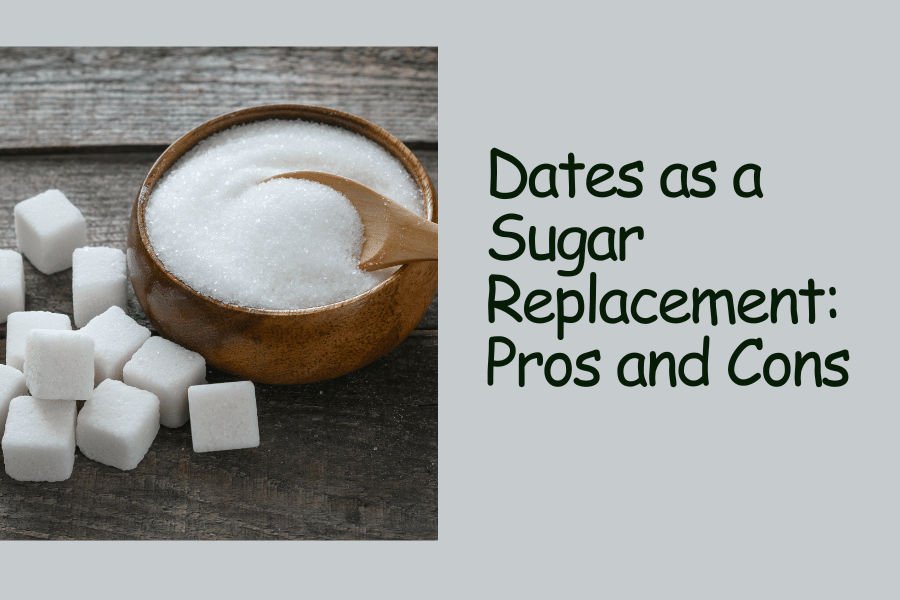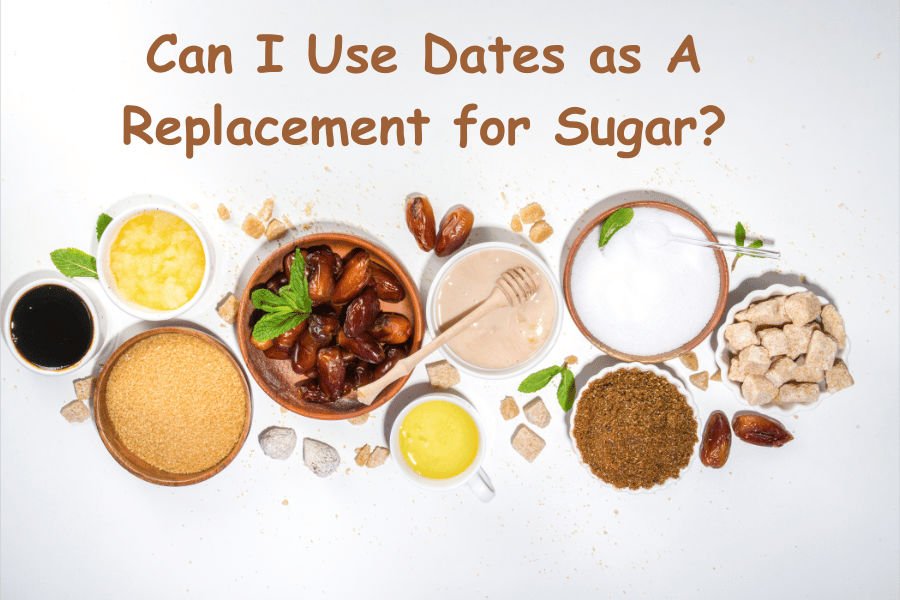Sugar adds sweetness to our treats, but it can also raise blood sugar levels. Dates, a naturally sweet fruit, have become a popular sugar substitute. But are they truly a perfect swap? Let’s delve into dates and their potential as a sugar replacement.
Dates: A Natural Sweetener
Dates are the fruit of the date palm tree, enjoyed for centuries in Middle Eastern cultures. They come in various varieties, each with a distinct taste and texture. Here’s a quick rundown:
- Medjool Dates: These are the most popular, known for their large size, soft texture, and caramel-like sweetness.
- Deglet Noor Dates: These are smaller and drier than Medjool dates, with a milder sweetness and a slightly chewy texture.
- Hayyani Dates: These are small and intensely sweet, often used in baking.

Pros of Dates as a Sweetener
- Natural Sweetness: Dates offer a natural sweetness compared to refined sugar.
- Fiber Powerhouse: Dates are packed with fiber, which helps regulate digestion and may prevent blood sugar spikes.
- Nutrient Rich: Dates are a good source of vitamins, minerals like potassium and magnesium, and antioxidants.
Cons of Dates as a Sweetener
- Higher Calorie Content: Dates contain more calories than granulated sugar. Be mindful of portion sizes.
- Less Sweetness: Dates are naturally less sweet than sugar, so you might need to use more to achieve the same level of sweetness.
- Texture Impact: Dates can alter the texture of baked goods, making them denser or chewier.
Dates vs. Sugar: A Detailed Comparison
Here’s a table to help you compare key aspects of dates and sugar:
| Feature | Dates | Granulated Sugar |
|---|---|---|
| Type | Whole Fruit | Refined Carbohydrate |
| Sweetener Power | Less Sweet | Very Sweet |
| Calories per 100g | 277 | 387 |
| Fiber Content | 7g | 0g |
| Glycemic Index (GI) | Lower GI (around 40-50) | High GI (around 60-70) |
| Additional Nutrients | Vitamins, Minerals, Antioxidants | None |
Note: GI (glycemic index) is a ranking system that shows how quickly a food raises blood sugar levels. Lower GI is better for blood sugar control.
Using Dates as a Sugar Substitute: Tips and Tricks
Dates can be a fantastic sugar substitute, but knowing how to use them effectively is important. Here are some tips:
- Soak and Blend: Soaking dates in water softens them and makes them easier to blend into a paste. This paste can directly replace granulated sugar in many recipes.
- Experiment with Ratios: Start by substituting half the sugar in a recipe with dates. Taste and adjust as needed. You might need to use slightly less date paste due to its natural sweetness.
- Mind the Texture: Dates can make baked goods denser. You might need to adjust other ingredients like flour or liquids to achieve the desired consistency.
- Complementary Flavors: Dates pair well with warm spices like cinnamon, nutmeg, and ginger.
Dates preferable to sugar as a sweetener
Date sweeteners, according to McWhorter, are a healthier alternative to table sugar, honey, or agave since they contain fiber. Keep in mind that these sweeteners should be used in moderation. According to the Food Information Council, a cup of dates contains 93 grams of sugar and 404 calories.
Do dates count as added sugar?
Date sugar is also rich in beta-carotene, lutein, and zeaxanthin. Although date sugar preserves many of the benefits found in whole dates, it is crucial to note that it contains more calories and is still classified as an added sugar.
How many dates equal a cup of sugar?
When substituting granulated sugar with Date Paste, use a 1:1 ratio, with 1 cup of Date Paste replacing 1 cup of sugar. If you’re substituting it for maple syrup, use a 2:1 ratio, meaning double the amount of Date Paste for every amount of maple syrup.
What is the best time to eat dates?
There isn’t a single “best” time to enjoy dates, but there are certain times when they might offer specific benefits:
- Mornings: Dates provide a natural energy boost and fiber to keep you feeling full until lunch.
- Pre-workout Snack: Their natural sugars offer readily available energy for your workout.
- Afternoon Pick-Me-Up: Dates can curb cravings and satisfy a sweet tooth without the crash of refined sugar.
- However, it’s best to avoid them right before bed since their sugar content could disrupt sleep.
Ultimately, listen to your body and enjoy dates whenever you crave a delicious and nutritious treat!
Is date sugar better than stevia?
Deciding between date sugar and stevia depends on your priorities. Here’s a breakdown to help you choose:
Date Sugar:
- Pros:
- Natural sweetness with a hint of caramel flavor.
- Rich in fiber, vitamins, and minerals.
- Lower glycemic index compared to sugar, meaning it provides sustained energy and less likely to spike blood sugar.
- Cons:
- Contains more calories than granulated sugar or stevia.
- Less sweet than sugar, so you might need to use more.
- Can affect the texture of baked goods, making them denser or chewier.
Stevia:
- Pros:
- Calorie-free, perfect for weight management or diabetics.
- Very sweet, requiring minimal amounts to achieve the desired sweetness.
- Doesn’t affect blood sugar levels.
- Cons:
- Intensely sweet, with a slightly bitter aftertaste that some dislike.
- Highly processed, not a whole food source like dates.
- May not be suitable for everyone; consult a doctor if pregnant or breastfeeding.
Here’s a quick comparison table:
| Feature | Date Sugar | Stevia |
|---|---|---|
| Sweetener Type | Natural | Artificial (highly processed) |
| Calories | Higher | Calorie-free |
| Sweetness Level | Lower | Very Sweet |
| Glycemic Index | Lower (around 40-50) | Doesn’t affect blood sugar |
| Additional Benefits | Fiber, Vitamins, Minerals | None |
What is the safest artificial sweetener?
There’s no single “safest” artificial sweetener as safety depends on individual factors and ongoing research. However, some sweeteners are generally recognized as safe (GRAS) by regulatory bodies like the US FDA. Here are a few contenders for the “safest” title, each with its pros and cons:
- Stevia: Derived from the stevia plant, stevia is calorie-free and doesn’t affect blood sugar. However, it has a very intense sweetness and can have a slightly bitter aftertaste that some dislike. Additionally, stevia is highly processed, unlike some other options.
- Sucralose (Splenda): This artificial sweetener is made from sugar but doesn’t raise blood sugar levels. Studies generally support its safety, but some research suggests it might affect gut bacteria in some people.
- Erythritol: A sugar alcohol naturally found in some fruits and fermented foods, erythritol is mostly calorie-free and doesn’t raise blood sugar. It has a clean taste and doesn’t cause digestive issues for most people in reasonable amounts. However, excessive consumption can lead to bloating and stomach upset.
- Monk Fruit Sweetener: Extracted from the monk fruit, this natural sweetener is calorie-free and doesn’t affect blood sugar. Studies suggest it’s safe, but long-term research is limited. It can also be more expensive than other options.
Here’s a table summarizing these sweeteners:
| Sweetener | Calorie-Free | Blood Sugar Impact | Pros | Cons |
|---|---|---|---|---|
| Stevia | Yes | None | Intense sweetness, natural | Aftertaste, highly processed |
| Sucralose | Yes | None | Versatile, well-studied | Potential gut bacteria impact |
| Erythritol | Mostly | Low | Clean taste, minimal digestive issues (in moderation) | Bloating at high intake |
| Monk Fruit | Yes | None | Natural, clean taste | Limited research, expensive |
What is the purest form of sugar?
The purest form of sugar, in the sense of being the most refined and concentrated sugar molecule, is granulated white sugar. Also known as table sugar or sucrose, it’s about 99.5% to 99.9% pure sucrose.
Here’s a breakdown:
- Sucrose: This disaccharide sugar is a combination of fructose and glucose molecules. It’s naturally found in many plants, but commercially it’s extracted and refined from sugar cane or sugar beets.
- Refining Process: The refining process removes most of the non-sugar components like molasses and minerals, leaving behind pure sucrose crystals.
Other Sugars and Purity:
- Raw Sugar: Often mistaken for being healthier, raw sugar is simply less refined than white sugar. It still contains around 96% to 98% sucrose, with some residual molasses that gives it a slight brown color and a hint of caramel flavor.
- Natural Sweeteners: While some natural sweeteners like dates or honey are touted as healthier alternatives, they are not pure sugar. They contain various sugars (fructose, glucose, etc.) along with other nutrients, fibers, and minerals.
Therefore, while pure sugar offers sweetness and is readily used in cooking, it lacks the additional nutrients found in less-refined options or natural sweeteners. It’s important to consume sugar in moderation for a balanced diet.
Conclusion
So, the answer is yes, you can use dates as a sugar replacement! They offer a natural sweetness, additional nutrients, and a lower glycemic index compared to sugar. However, keep in mind their higher calorie content and potential textural changes in baking. Experiment, have fun, and enjoy the delicious world of dates as you sweeten your treats!

I’m a seasoned content creator with 6+ years of experience crafting engaging, SEO-optimized content that drives traffic and rankings. I excel in keyword research, link building, and guest posting, ensuring your brand reaches new heights.

